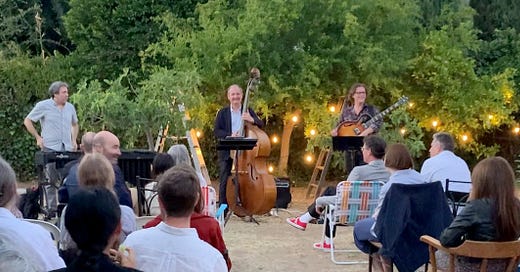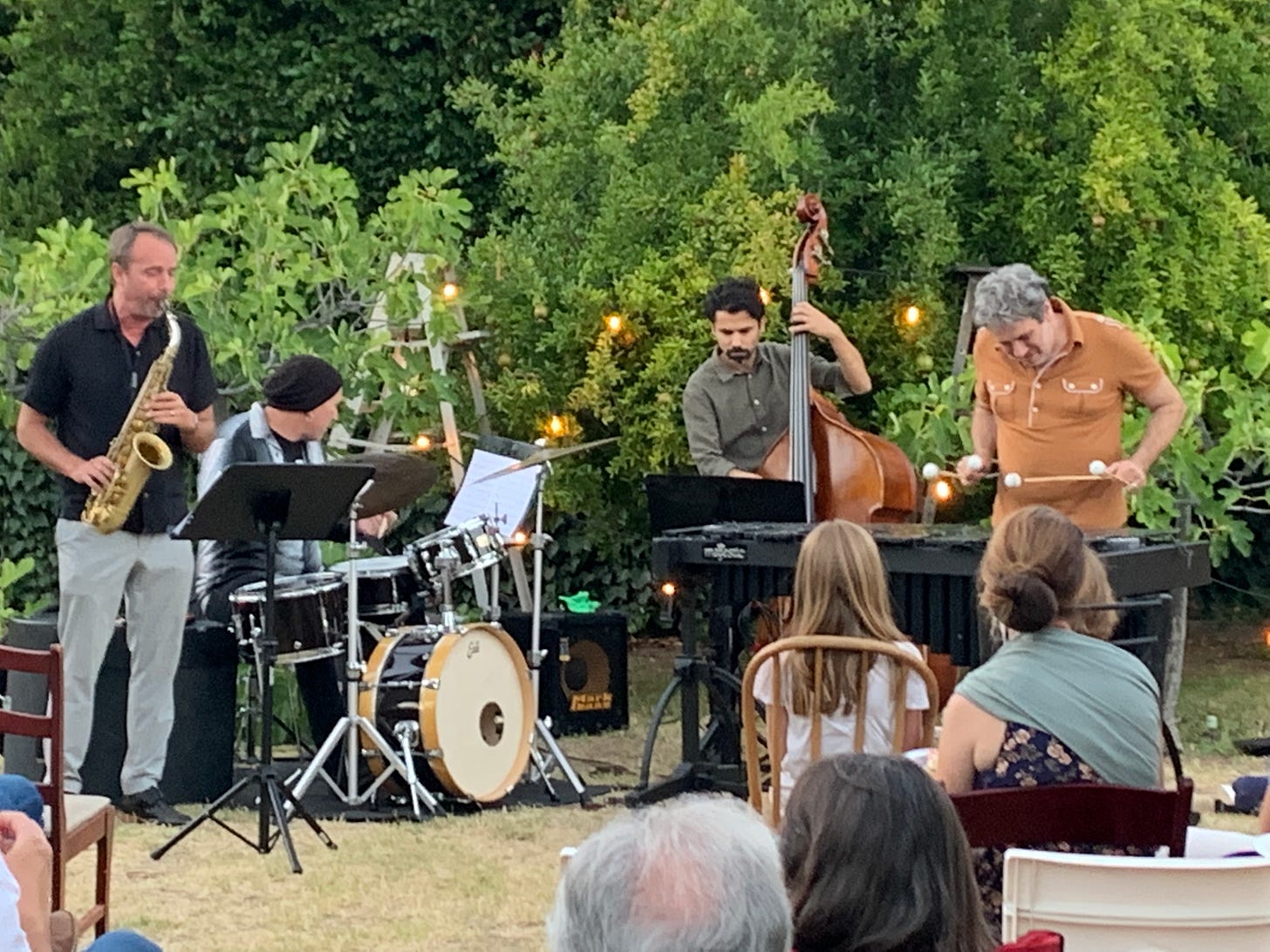For the past five years, my wife and I have been putting on small cultural events in our backyard and collaborating with others to host such events—jazz concerts, film screenings, book launches, poetry readings. It has been a great way to foster conversations and generate excitement around music, poetry, film, and literature. It’s fun. It connects talented artists with appreciative audiences. And it’s remarkably easy to do.
For many people, organizing a house concert or a book launch is an extension of their outgoing personality, an almost instinctive activity. But my wife and I are not big party people. We had hosted birthday parties, but that was about it. So when we started inviting groups of people over to hear live music or watch a film, it felt distinctly adventurous.
Today, the rise of AI has made in-person events seem not only valuable but crucially important. Gathering with others to enjoy music or literature is a form of leisure that transcends the utilitarian logic of instantaneous outputs. But at the time, we didn’t really have a “thesis” in mind to justify our undertaking. We just jumped in.
For us, it started in 2020 when a well-meaning friend suggested we screen a new faith-based film at our house. He had heard good things. With some trepidation, we agreed, naively trusting manufactured buzz without having seen the film. We even purchased a projector and screen for the occasion.
The results were, shall we say, underwhelming: despite a strong scene or two, the film was awful. The friends who sat through it in our small living room made the best of the situation. The post-screening conversation was fun and interesting. But I was embarrassed and, frankly, mad—mostly at myself for having failed to vet our offering in advance. I vowed to organize another event that would actually be good.
A few months later, in 2021, I learned that my friend Nick, a professional jazz vibraphonist, was coming through Los Angeles on tour. The COVID lockdowns were finally loosening. The weather was splendid. I asked Nick if he would play for us and some of our friends. He found a remarkable bassist and a superb LA-based guitarist, and we set up in our backyard (so dusty in the summertime as to really be more of a back lot) and asked everyone to bring extra chairs:
A nice crowd of friends and acquaintances showed up. The trio was outstanding. The audience was engaged. We passed the hat and the musicians got paid. And my wife and I felt like we had done something worthwhile.
The next summer, we did it again. This time, Nick’s band was a quartet:
We have generally invited more people than we think the venue (our backyard or living room or someone else’s) can comfortably accommodate. Too many people jammed into a room to listen to a jazz musician or a poet is much better than a group that’s awkwardly thin. The energy of an enthusiastic crowd can inspire the artist:
We have tended to guarantee a base fee in advance—a couple of hundred dollars per musician, give or take. We tell invitees to expect that a hat will be passed, mention a suggested donation the night of the event, and put out a basket with a sign that reinforces that suggested amount (usually $20).
Most recently, at an event we helped organize at the home of friends, attendees sent donations directly to the lead musician by Venmo. He then paid his sidemen. When the performance is good, people give willingly. The musicians have always received more than their guaranteed fee, sometimes quite a bit more.
For a recent poetry reading, we did not ask for donations from invitees. Instead, I partnered with a generous friend who single-handedly underwrote the event. (The arts cannot flourish without such patronage.)
We rented a nice room, had wine and cheese catered, and ordered an assortment of the poet’s books in advance. He read for about forty-five minutes, varying comic verses with more serious poems, and then skillfully engaged the audience in a conversation. We encouraged everyone to buy books using QR codes that linked to online payment accounts. The evening concluded with a book signing.
Not only do our friends keep showing up for these events, but they offer food, labor, and money to support them, or even take on hosting responsibilities themselves. Here’s a clip of a virtuosic LA-based clarinetist soloing on “Stella by Starlight” in the living room of a gracious local couple:
Getting involved in “backyard culture” has enriched our lives and given us the joy of contributing something to our community. We are planning another poetry reading for the fall. I also want to organize a jam session that would bring together professional musicians and talented area amateurs. And it would be fun to do something with a fiction writer.
There are philosophical reasons to put on these events. The rise of generative AI poses big questions about the meaning of art and culture. In the abstract space of the internet, artists can feel lost and dizzy. There is a serious problem of overproduction to go along with a cruel deficit of attention. Backyard culture is warm, human, and satisfying for both audiences and artists. It is one good way to address the current crisis of mass culture.
But the philosophical reasons, salient as they are, take second place to more immediate motives: bringing friends together to listen to beautiful music or poetry is simply an extremely enjoyable thing to do. That excuse suffices.






Love it
I love this idea. May I ask, do you have kids? I have two young kids and I love the idea of them growing up around events like this. I grew up in a secondhand bookstore and even though my parents did events way, way less often than at a new bookstore, readings and live music of the type you mention here were a fixture of my childhood, and I didn’t realize how lucky I was til later.